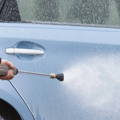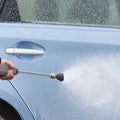Everything You Need To Know About Pressure Washer Detergent
Published:
10/27/2021
Pressure washer detergent is an essential component of getting a perfect clean from your pressure washer. Utilizing the wrong detergent can render damaged or even ruined surfaces, resulting in expensive fixes and negative customer reviews.
This guide is here to help you navigate everything there is to know about pressure washer detergents. From what types of detergents there are, the science behind them, and which ones you should use for specific industries, you’ll be able to walk away feeling confident in your decisions and providing your customers with exceptional service.

- Breaking Down 5 Types of Pressure Washer Detergent
- The Science Behind Water Solubility and Power Washer Detergent
- Chem 101: What Makes Industrial Pressure Washer Cleaning Solution Work?
- The Hidden Truth Behind Pressure Washer Cleaner for Cold-Water Machines
- How to Select the Best Pressure Washer Detergent by Industry
- Properties of Eco-Friendly Power Washer Soap
breaking down the 5 types of pressure washer detergent
While consumer demand may prompt the change, businesses in nearly every sector need to weigh the effects of their business on the environment. The power washing industry is no exception. Environmentally unfriendly cleaners can kill plants, weaken grass, and pose hazards to local wildlife and pets. When the cleaners are washed away into street drainage, they can accumulate in the local water system, where they can contaminate overall municipal systems or linger in the water. Switching to green cleaners preserves local plants and wildlife around the cleaning site and doesn't pose as significant a risk of toxicity for the surrounding area.
1. All-Purpose Cleaner Detergent
All-purpose detergents are what you find most commonly at hardware stores in gallon jugs. They are typically pre-mixed and work well for most residential projects. They are affordable and accessible to your average homeowner who needs them to complete projects around their home.
2. Degreaser
Degreasers are used for removing grease and oil from surfaces. They are perfect for cleaning oil stains from garage floors, cleaning engines, or any use with greasy buildup.
3. Vehicle Detergent
As described by the name, these detergents are best for cleaning automobiles, boats, campers, and transportation fleets. They are safe to use on paint and trim surfaces and can contain unique algae remover for boat-specific projects.
4. Residential Deck and House Detergent
This type of detergent is perfect for cleaning siding, decking, and even fencing. Some specialized formulas will protect against the elements to preserve the paint and remove dirt engrained in the wood.
5. Specialized Solutions
You may need to purchase a specialized formula for a project that doesn’t fit into these other categories. To determine whether or not you need a specialized solution, pay attention to the uses and applications.
Choosing a suitable detergent for your specific job will help you save time, money and provide a flawless clean without worry of damage.
Continue reading Five Types of Detergents >>
the science behind water solubility and power washer detergent
You already know that the wrong detergent can mean damaged or ruined surfaces. To dive deeper into this subject, it’s essential to understand that different combinations of tools and detergents can result in subpar results and even financial penalties. As a professional, it’s important to understand these regulations.
Residential vs. Commercial Power Washer Detergent
Residential and commercial detergents are made very differently to offer varying levels of power and ability. The main difference comes down to commercial detergent being much stronger than residential, up to 10 times as strong. Commercial detergents also come in concentrations rather than pre-mixed, allowing professionals to mix the solutions themselves to adjust to individual job requirements.
Commercial detergents are also sold as concentrations to increase efficiency. Pre-mixed solutions take up more space during the shipping process because water is bulky and heavy. However, transporting concentrations without the water saves space and, therefore, money.
Understand Water Solubility
Water has set surface tension. This tension is what makes water bead up on surfaces. Detergent works to reduce the surface tension so that the water can run evenly across the surface. Water also has a set tolerance for solubility, which measures a material’s ability to be dissolved. In this case, water can only hold so much detergent before no additional detergent can be evenly distributed throughout.
Professionals need to understand how much water should be mixed with the detergents they are using to achieve optimal safety and effectiveness. Mixing detergent with less water won’t necessarily produce a more robust clean.
Another factor to consider is the water temperature. Hot water can dissolve more detergent than cold. If you add equal amounts of detergent to a cold-water machine and a hot water machine, the hot water will more powerfully react to the characteristics of the detergent and more efficiently utilize the cleaner; the cold water, however, will dissolve a smaller portion of the cleaner, ultimately reducing its cleaning potential.
Continue reading The Science Behind Water Solubility>>
chem 101: what makes industrial pressure washer cleaning solution work?
Now that you understand the different kinds of detergents and how water and the various solutions combine, it is important to explain how pressure washer cleaning solutions work.
How Does Pressure Washer Solution Clean?
While it may seem like strong pressure is the most important aspect to produce a good clean with pressure washers, cleaning solutions are vital to helping loosen dirt and grime so the water can wash it away. Once you know how this process works, it’ll be easier to determine what kind of detergent or solutions you need and how much you require for specific jobs.
Detergents
Detergents are non-soap cleaners that are usually made from synthetic ingredients and are surfactants.
Surfactants
Surfactants help break down the high surface tension that water contains. Water molecules have a hydrophobic end (which repels water) and a hydrophilic end (which attracts water).
Surfactants break down this bond that water has with itself and allow it to disperse more evenly over surfaces by forming spherical shapes called micelles. Micelles orient the water-loving ends to the outside and the water-hating towards the center, which helps trap the soil in the middle to be washed away easier.
Knowing how cleaning solutions work and how they react with different surface types protects your company from costly repair jobs and lost business.
Continue reading What Makes Industrial Pressure Washer Detergents Work >>

the hidden truth behind pressure washer cleaner for cold-water machines
Detergents work differently in hot water vs. cold water. Since cold water can’t dissolve as much detergent and therefore won’t have the same power as a hot-water machine, it is important to pay extra attention, so you don’t lose out on cleaning capability.
Hot Water vs. Cold Water Pressure Washer Cleaner
Hot-water washers can heat water up to 200° F. Hot water can more easily break down grease and oil and strip away organic material like bacteria from surfaces. Hot-water cleaners also provide additional sanitation benefits for highly regulated industrial or commercial environments.
Cold-water cleaners rely on water pressure rather than temperature to deliver a strong clean. Since cold water doesn’t have the same bond-breaking power, these cleaners often need to be paired with detergents. Cold water can also clean certain surfaces like wood or plastic that may be damaged by hot water. Both machines have pros and cons, so picking a suitable machine for your job is essential.
Improving Your Cold-Water Machine
Hot-water machines tend to be more expensive and aren’t ideal for some cleaning projects, while cold-water machines are more of an all-purpose option. To get the same level of cleanliness out of your cold-water machine, you need to choose the correct detergents and techniques carefully.
Hot-Water Active Ingredients
Detergents with hot-water active ingredients transform cold-water detergents into super-powered versions of themselves. These powerful ingredients activate the detergents, meaning you can get more mileage out of each unit of detergent without overloading your pressure washer or wasting excess soaps.
Continue reading The Hidden Truth Behind Pressure Washer Detergent For Cold Water Machines >>
how to select the best pressure washer detergent by industry
Different pressure washer jobs require different detergents. Using the wrong detergent could result in damaged or ruined surfaces, costing your company customer reviews and money. Here are a few kinds of detergents you should use for specific jobs.
Oil & Gas Industry
Degreasers are best for the oil and gas industries because they are built to break up grease stains. You can pair this type of detergent with hot water for an even deeper clean.
Transportation
The transportation industry requires detergents that are safe on vehicles, which means you should be using vehicle detergent. This kind of cleaner is made to clean well while retaining delicate paint jobs on cars, boats, and vehicle fleets.
Food Industry
Detergent and disinfectants are perfect for the food industry. You can begin with a detergent that will help remove dirt and grime from surfaces and then follow up with a disinfectant to kill organic matter like bacteria in or around food preparation spaces.
Residential
An all-purpose cleaner will be perfect for most residential projects. These types of detergents are strong enough to provide a solid clean but safe to use on siding, fences, and decks.
Continue reading How To Select The Best Pressure Washer Detergent For Your Industry >>
properties of eco-friendly power washer soap
Finding detergents and compounds that will get the job done in the most efficient way possible is your number one priority. However, consumer interests have begun to shift, and more people are interested in eco-friendly options. Offering these types of soaps and detergents will help you stay relevant in an ever-changing competitive market.
Why You Should Offer Eco-Friendly Soap
There are many reasons you should offer eco-friendly options in your power washing business.
Here are a few:
1. They Are Good for the Environment
Chemicals in detergents can be bad for the environment, and businesses need to understand the damage they are potentially causing. In the power washing industry, these detergents can accumulate in the local water system and potentially contaminate municipal water systems. Offering green cleaning solutions will preserve local wildlife, plants and protect the surrounding water.
2. You Can Save Water
Eco-friendly cleaning solutions are created to provide the same level of cleanliness with less water. Less water means lower water bills which will save you money.
3. They Are Safer to Use
Eco-friendly cleaners have fewer toxic chemicals than non-green options. This means they are easier to mix and use without the potential for hazards.
What Makes Power Washing Soap Eco-Friendly?
It is important to know what to look for to determine whether a cleanser is eco-friendly. One of the main characteristics that eco-friendly soap provides is fewer chemicals and even fewer ingredients in general. Having fewer ingredients makes it easier for you and your team to predict and control its effect on different surfaces.
Eco-friendly soap is also biodegradable, which means it will begin to degrade when exposed to hot water. This helps break it down, so it won’t build up in surrounding soil and water sources.
Eco-friendly soap also requires less water to unlock its cleaning capabilities. They are extremely soluble and work very well with water, making them safe for delicate surfaces like glass.
You can find these eco-friendly solutions by consulting with your local power washing experts or just reading the label of different detergents and soaps.
NorTex has you covered when it comes to your power washing detergent questions. We maintain extensive inventories of cleaners in the DFW and Central Texas area and have the knowledge to help you find the perfect cleaning solution for your job and industry.
For help on power washing detergents, contact us today.
Share this Article ↓




